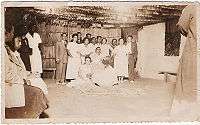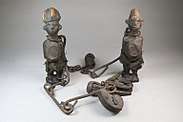Candomblé Bantu
Candomblé Bantu (also called Candomblé Batuque or Angola) is one of the major branches (nations) of the Candomblé religious belief system. It developed in the Portuguese Empire among Kongo and Mbundu slaves who spoke Kikongo and Kimbundu languages. The supreme and creative god is Nzambi or Nzambi a Mpungu. Below him are the Jinkisi or Minkisi, deities of Bantu mythology. These deities resemble Olorun and the other orishas of the Yoruba religion. Minkisi is a Kongo language term: it is the plural of Nkisi, meaning "receptacle". Akixi comes from the Kimbundu language term Mukixi.[1]
| Candomblé Bantu | |
|---|---|
 Candomblé Bantu practitioners in Bahia, 1940s | |
| Classification | Afro-Brazilian religion |
| Priesthood | Mãe-de-santo or Pai-de-santo |
| Part of a series on |
| Kongo religion |
|---|
 |
| Theology and concepts |
| Derivatives |
Etymology
The word "Bantu" means "people"; it is a combination of ba, a plural noun marker and -ntu, meaning "person". "Banto" was a generic term used by the Portuguese in Brazil to describe people who spoke Bantu languages.[2]
Pantheon
- Nzambi is the "sovereign master"; he created the earth, then withdrew from the world. Nzambi Mpungu remains responsible for rainfall and health.[3]
- Aluvaiá (also Bombo Njila, Pambu Njila, Nzila, Mujilo, Mavambo, Vangira, Njila, Maviletango) is an intermediary between human beings and other Nkisi; he is additionally the protector of the houses.
- Nkosi Mukumbe (also Hoji Mukumbi, Panzu, Xauê) is the Nkisi of roads, agriculture, and iron. He is associated with Ogun in Yoruba religion.
- Mutalambô
- Gongobira
- Katendê
- Loango
- Kaviungo
- Angorô and Angoroméa
- Kitembo
- Matamba
- Kisimbi
- Kaitumbá
- Zumbarandá
- Wunje
- Lembá Dilê
References
- Giroto, Ismael (1999). O Universo Mágico-Religioso Negro-Africano e Afro-Brasileiro: Bantu e Nàgó. Departamento de Antropologia da Faculdade de Filosofia, Letra e Ciencias Humanas da Universidade de São Paulo. doi:10.11606/T.8.1999.tde-20062011-140307.
- "Bantu". Merriam-Webster's Unabridged Dictionary. 2018. Retrieved 2018-04-25.
- Asante, Molefi Kete; Mazama, Ama, eds. (2009). "Creation and Cosmology". Encyclopedia of African Religion. 1. Sage. ISBN 9781412936361.